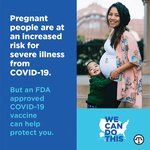

by the We Can Do This COVID-19 Public Education Campaign
(NAPSI)—Questions and misinformation about the effect of COVID-19 vaccines on fertility and pregnancy have left some people uncertain about getting vaccinated if they are pregnant or hoping to get pregnant, but the facts should be reassuring.
“It’s understandable that parents and those who hope to become parents are cautious about COVID-19 vaccines,” said Dr. Scott Stienecker, Medical Director for Infection Prevention, Epidemiology and Stewardship in Fort Wayne, Indiana. “However, it should be comforting to know that the vaccines are safe and effective during pregnancy. Growing data and science demonstrate that the benefits of getting vaccinated far outweigh any risks, and we have a long history with vaccines that makes it clear they do not affect future fertility.”
Here are key facts about fertility, pregnancy, and the COVID vaccines:
Getting vaccinated protects you during and after pregnancy. COVID-19 can be especially dangerous for people who are pregnant or have recently been pregnant as cases during pregnancy are more likely to be severe. COVID is dangerous for the unborn child too. A recent study found COVID infections are associated with an increased risk of stillbirth. Safety monitoring systems and studies have shown that the COVID vaccines are safe for people who are pregnant, and vaccination reduces the risk of severe illness, hospitalization, and death. Growing data continues to reinforce that the risks from getting COVID-19 at any stage of pregnancy are far worse than potential side effects from vaccines.
Getting vaccinated protects your unborn or nursing child. Data from safety monitoring systems continues to show vaccines are safe for pregnant people and their babies and getting vaccinated is much safer than contracting COVID. If you’re breastfeeding, getting vaccinated could even help protect your baby, as recent reports have shown that some breastfeeding parents have antibodies in their breast milk after they’ve been vaccinated.
COVID vaccines will not interfere with getting pregnant. No evidence exists of COVID vaccines causing problems with fertility. In a recent study, people who had gotten the COVID vaccine had the same pregnancy success rate as people who had not been vaccinated. Vaccines are carefully studied and monitored, and it is clear they are safe for people who are pregnant or who want to become pregnant. If you are trying to become pregnant, you do not need to avoid pregnancy after receiving a COVID vaccine. If you get pregnant after your first shot, you should get the second shot and a booster on schedule for the most protection possible.
Knowing the facts about COVID vaccines can provide confidence and comfort. Anyone with concerns should ask questions of a trusted health professional, such as a family physician, pharmacist, or nurse. The benefits of vaccination far outweigh potential risks. Vaccines are the best way of getting this pandemic under control.
For more information and to find a vaccine, visit www.vaccines.gov.